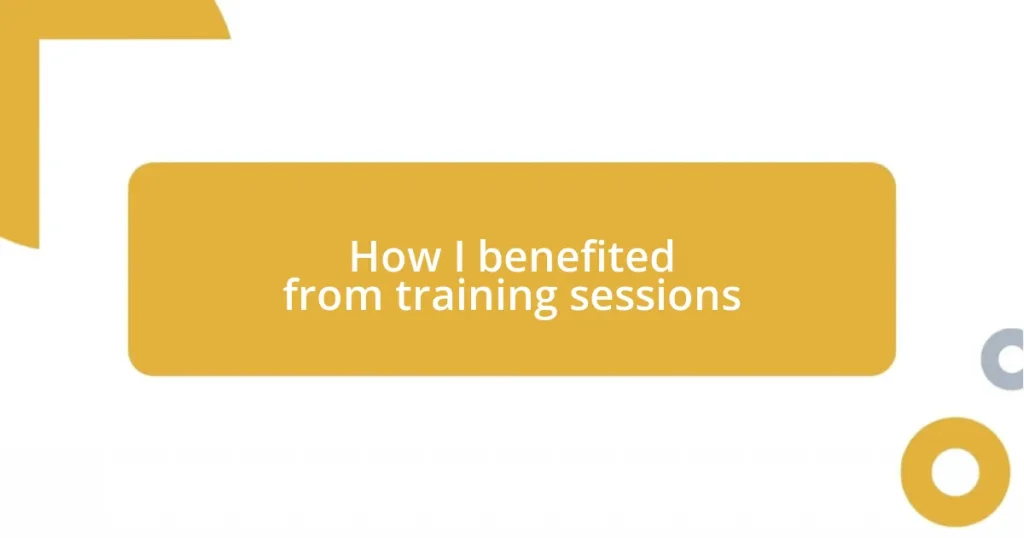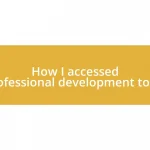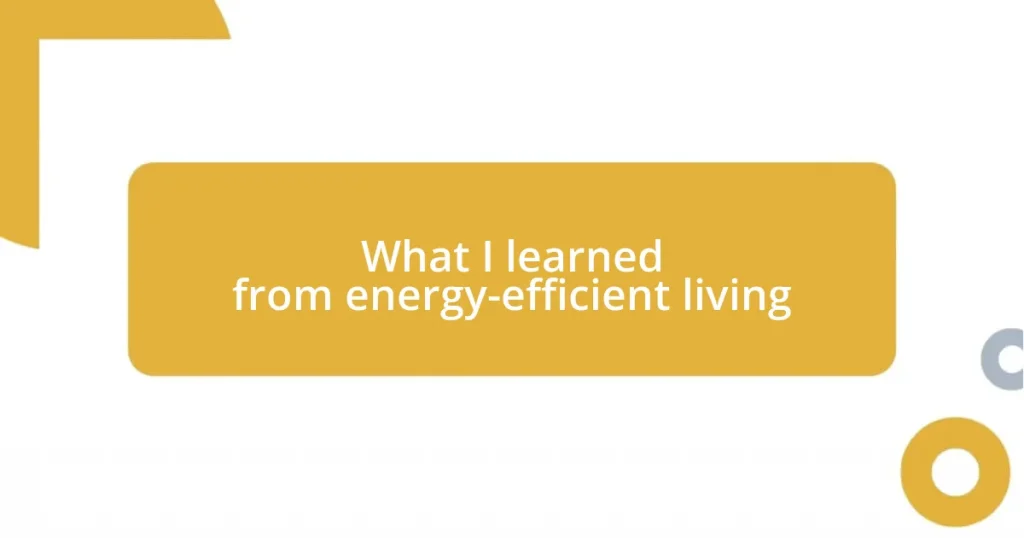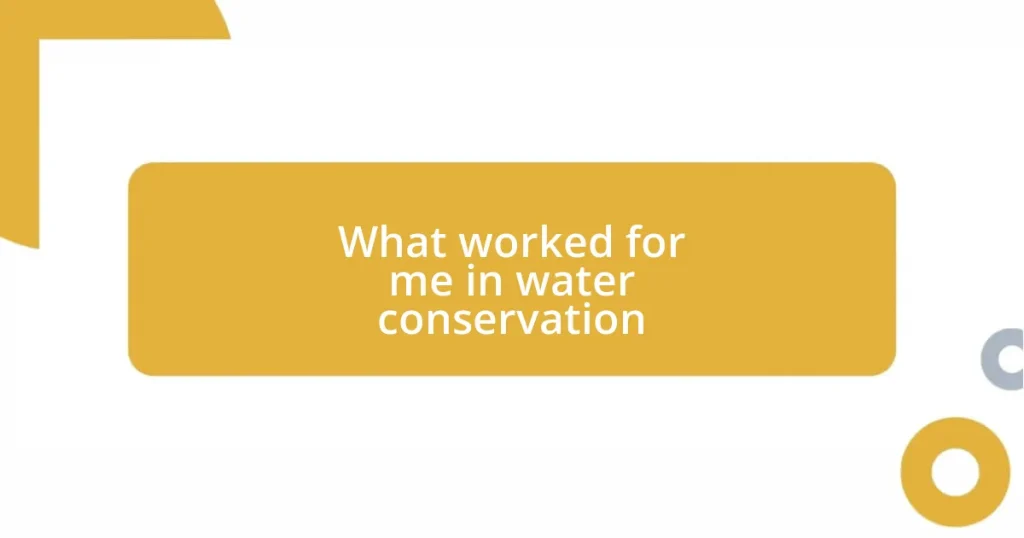Key takeaways:
- Training sessions are interactive, enhancing camaraderie and personal growth through shared experiences.
- Setting clear, specific training goals fosters motivation and directs focus on desired skills, ensuring purpose in learning.
- Real-world application of learned skills leads to noticeable improvements in confidence and performance in professional situations.
- Measuring progress through self-reflection and tangible metrics validates development and encourages ongoing growth.

Understanding Training Sessions
Training sessions are more than just scheduled times to learn; they’re opportunities for growth and connection. I still remember my first training session, filled with nervous energy, unsure of what to expect. Looking back, that session not only expanded my skill set but also introduced me to a network of inspiring colleagues.
What stands out about these sessions is their interactive nature. Engaging in discussions and activities allows participants to digest information more deeply. Have you ever found yourself in a group activity where suddenly everything clicked? In those moments, I felt a sense of camaraderie, realizing we were all on this learning journey together, which made the experience so much more fulfilling.
Additionally, training sessions often challenge us to step outside our comfort zones. I recall a particularly tough role-play exercise where I stumbled through my part. Despite the embarrassment, it was a defining moment, teaching me resilience and the importance of vulnerability in learning. Each session offers a slice of discomfort that, when embraced, transforms into personal and professional development.

Identifying My Training Goals
Identifying my training goals felt like mapping out a journey that I deeply wanted to undertake. Initially, I had a vague idea of wanting to improve my communication skills, but once I sat down and reflected, I realized I needed to be more specific. I set a goal to become more effective in public speaking, as it had always made me anxious. By pinpointing the areas I wanted to work on, I felt a renewed sense of purpose.
Here are some key points I considered when establishing my goals:
- Personal Development: How do I envision myself growing?
- Skill Acquisition: Which specific skills do I want to master?
- Feedback: Am I open to constructive criticism and willing to apply it?
- Networking Opportunities: What connections do I hope to make during these sessions?
- Long-Term Vision: How do these goals align with my career aspirations?
Reflecting on these questions not only clarified my intentions but also fueled my motivation throughout the training sessions. Each session became a stepping stone toward my aspirations, and that realization made the struggle of facing my fears in public speaking worthwhile.

Types of Training Sessions Available
Certainly! Here’s the content for the section titled “Types of Training Sessions Available.”
Training sessions can take various forms, each catering to different learning preferences and objectives. For instance, I’ve participated in workshops that are incredibly hands-on, allowing me to instantly apply what I’ve learned. In one particular workshop on digital marketing, I remember creating a mock campaign, which solidified my understanding of the subject in a way that a standard lecture never could. Have you ever tried something practical, only to have the concepts click into place? It’s those moments that make me value interactive training the most.
Another type I’ve embraced is the online training session. These are especially convenient and often allow for a diverse group of participants from different locations. I recall a fascinating online course on leadership skills, where we engaged with peers from around the world. The shared experiences enriched my learning as everyone brought unique perspectives. It’s remarkable how digital platforms can facilitate collaboration and connection across borders.
Finally, mentorship programs stand out as a unique training experience. I once had the chance to engage in a mentorship where I received personalized guidance from an industry veteran. The insights gained in those one-on-one sessions were invaluable. It felt like having a tailored roadmap to navigate my career path, grounded in real-world experience. Have you ever wished for someone to guide you through your professional journey? For me, that mentorship was a game-changer.
| Type of Training Session | Description |
|---|---|
| Workshop | Hands-on, practical learning experiences. |
| Online Training | Flexible sessions that allow participants from various locations to engage. |
| Mentorship | Personalized guidance from experienced professionals. |

Key Benefits of Training Sessions
Participating in training sessions has offered me a wealth of benefits that extend beyond just skill enhancement. For instance, I vividly remember feeling overwhelmed at the thought of public speaking. However, each dedicated session helped me build confidence, allowing me to express my ideas more freely. It’s incredible how that shift in self-assurance can influence not just your performance, but your overall outlook on professional interactions. Have you ever faced a similar fear that melted away with practice?
Another key benefit has been the opportunity for networking. During training sessions, I have met individuals who were once strangers but have now become valuable connections. I recall a particularly engaging training event where a casual conversation led to a collaborative project. It’s amazing how these experiences can foster relationships that might not have developed in more traditional work environments. Who knew a shared learning space could transform a mere acquaintance into a potential partner?
Additionally, receiving constructive feedback has been instrumental in my growth. In one session, a peer offered insights about my presentation style that I had never considered. At first, it felt daunting to receive that critique, but I soon realized it was a cornerstone of improvement. Embracing feedback, even when it stings, catapults your progress forward. Have you ever hesitated to seek feedback, only to discover its power later? It’s through learning to embrace these moments that I’ve truly evolved.

Implementing Training Strategies
Implementing effective training strategies is crucial for maximizing the benefits of any session. I’ve found that setting clear objectives ahead of each training event enhances the experience significantly. For example, when I focused specifically on improving my time management skills during a recent workshop, I was able to direct my attention toward techniques that truly made a difference in my daily routine. Have you ever gone into a learning experience without a specific goal, only to realize how aimless it can feel?
In addition to defining goals, adapting the delivery methods to fit the audience really makes a difference. During one of the training sessions I attended, the facilitator incorporated interactive polls and breakout discussions, which kept everyone engaged. Personally, that created a dynamic atmosphere where I felt comfortable sharing my thoughts and learning from others. Have you ever participated in a monotonous session where your mind drifted? It highlights how tailored approaches can energize the learning environment.
Another effective strategy involves follow-up actions after training. I make it a habit to implement at least one takeaway from each session into my work within the week. Just last month, I incorporated a new project management tool I learned about, which has streamlined my workflow remarkably. It’s amazing how quickly applying a fresh idea can lead to tangible improvements. Do you actively use what you learn, or do you find those insights slipping away? Emphasizing actionable steps is key to reinforcing what you’ve gained.

Measuring My Progress
Tracking my progress after each training session has been an eye-opening experience. I remember after a workshop focused on negotiation skills, I kept a journal where I noted down my successes and areas for improvement. It was encouraging to revisit those entries weeks later and see how far I’d come. Have you ever documented your growth in a way that surprised you?
Using metrics to measure my enhancement has also proven valuable. For instance, I set a goal to increase my efficiency in resolving conflicts within a team. After a few sessions, I calculated the time it took for me to reach resolutions compared to before. The numbers reflected a significant improvement, making the effort feel truly rewarding. Isn’t it fascinating how tangible measurements can validate our soft skills development?
Through self-reflection, I grasped how my emotional responses shifted as I became more skilled. Initially, I would feel anxious during role-play exercises. Yet, as I progressed, I noticed a transformation—what once brought anxiety now sparked excitement. I’m curious, have you ever felt a similar shift where discomfort turned into enthusiasm with practice? It’s this gradual evolution that showcases the deep, personal impact of training on our lives.

Applying Skills in Real Life
Once I started applying the skills I learned in training sessions, I felt a noticeable shift in how I tackled real-life challenges. For example, after a course on public speaking, I volunteered to lead a team meeting. The techniques I practiced helped me project confidence, and the feedback was overwhelmingly positive. Have you ever tried out a new skill only to surprise yourself with how well it worked?
Sometimes, the real-world application of these skills comes in unexpected ways. I remember attending a session on emotional intelligence that emphasized active listening. A few days later, during a difficult conversation with a colleague, I consciously practiced that technique. It transformed a potentially tense situation into a constructive dialogue. Have you experienced a moment where a skill you just learned suddenly became crucial?
I’ve also discovered that some skills need gradual integration into my daily life to really take hold. When I learned about conflict resolution strategies, it felt daunting to apply them immediately. However, by taking small steps—like addressing minor disagreements first—I built confidence over time. This layered approach allowed me to thrive in more significant situations down the line. What about you? Do you find that incremental application helps reinforce your new skills?















